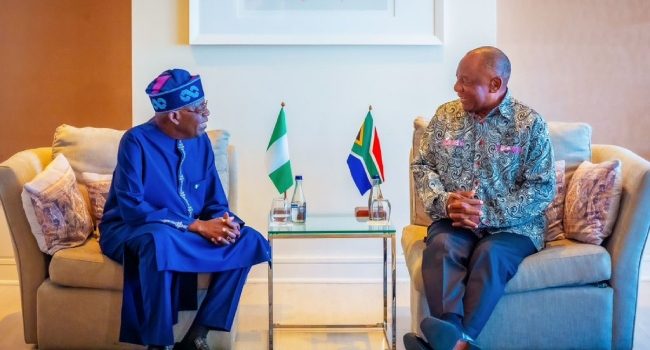The 11th session of the Nigeria-South Africa Bi-National Commission (BNC), held in Cape Town on December 3, 2024, marked a pivotal moment in fostering deeper economic collaboration between the two leading African nations. Attended by Nigeria’s President Bola Tinubu and South Africa’s President Cyril Ramaphosa, the meeting yielded significant developments, particularly in the areas of visa facilitation and business cooperation.
In a landmark announcement, President Ramaphosa unveiled simplified visa processes aimed at enhancing travel and business opportunities for Nigerians in South Africa. Key measures include a five-year multiple-entry visa for qualifying Nigerian businesspeople and a streamlined visa application process for tourists, eliminating the need to submit physical passports.
“Our efforts to create a favorable environment included simplifying the visa process for Nigerian business people traveling to South Africa,” President Ramaphosa stated. “Qualifying Nigerian business people were granted a five-year multiple-entry visa.”
The move underscores South Africa’s commitment to eliminating barriers to investment and fostering economic collaboration. Ramaphosa highlighted the robust diplomatic ties between the two nations, which recently celebrated 30 years of formal relations.
“Our strong bonds of friendship provided a solid foundation for more meaningful economic cooperation,” he remarked, emphasizing the shared goal of creating opportunities for mutual growth.
Enhancing Investment and Business Ties
Both presidents acknowledged the vital role of private sector engagement in strengthening bilateral relations. Ramaphosa commended Nigeria for hosting numerous South African companies, while expressing a desire to see more Nigerian businesses operating in South Africa.
“We needed to remove the remaining constraints to greater investment and address some of the challenges faced by companies,” Ramaphosa noted.
President Tinubu reiterated Nigeria’s readiness to deepen economic collaboration, particularly in infrastructure and mining sectors, while also inviting South African investors to explore Nigeria’s burgeoning fintech and tech-driven sectors.
The BNC also emphasized ongoing reforms in both countries aimed at improving the ease of doing business. Ramaphosa cited South Africa’s initiatives to attract foreign investors and foster trade across various sectors.
“Our government continued its efforts to improve the ease of doing business in South Africa,” he said. “We wanted to enable investors to operate, trade, and pursue opportunities across various sectors.”
Commitment to Pan-African Development
The discussions extended beyond bilateral relations, touching on broader African development. Ramaphosa highlighted South Africa’s commitment to championing the African Union’s Agenda 2063 at the G20.
“It was the first time the G20 Leaders’ Summit would be held on African soil. We sought to galvanize support for the AU’s Agenda 2063 as we pursued an inclusive global agenda,” he noted.
The meeting reflected the two nations’ shared vision for a more united and economically empowered Africa. By addressing visa barriers, fostering investments, and championing continental development goals, Nigeria and South Africa are setting the stage for stronger regional collaboration.
A New Chapter for Bilateral Relations
The outcomes of the 11th BNC session demonstrate a commitment to enhancing the partnership between Africa’s two largest economies. With streamlined visa processes, increased investment opportunities, and a focus on shared development goals, Nigeria and South Africa are poised to drive growth not only within their borders but across the continent.
As both nations move forward, the strengthened ties are expected to unlock greater economic potential, foster innovation, and solidify their positions as key players in the global arena.


